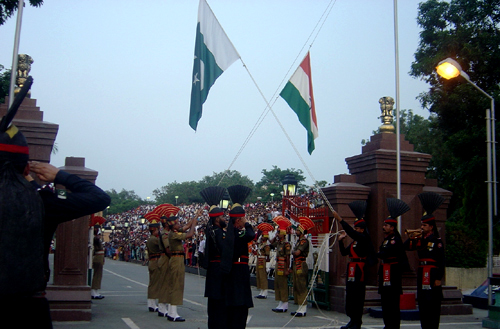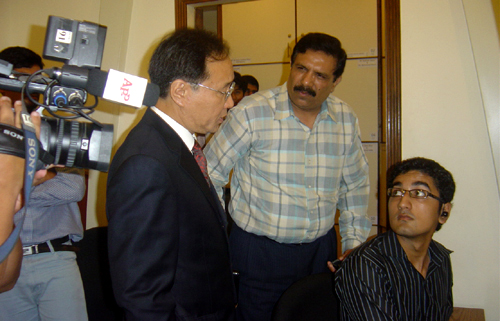"We want to sit down with India and have meaningful dialogue."
The extremist dynamics in northwestern border areas are not the only problem facing Pakistan. On its eastern border, Pakistan has long had a difficult relationship with India, mainly because of the related issues of security and Kashmir.
 |
|
"Lowering of the flags" is a daily ceremony at Wagah, the only road border crossing between Pakistan and India. Wagah itself is a village which was divided by independence in 1947. Today, the eastern half of the village remains in India while the western half is in Pakistan. [Chen Qiuping/china.org.cn]
|
India broke off a five-year-long formal peace process following last year's attack on Mumbai by Pakistan-based militants, who India says must have received help from elements within Pakistan's security services.
But in July this year, Pakistan Prime Minister Yousaf Raza Gilani and his Indian counterpart, Prime Minister Manmohan Singh, met on the sidelines of a Non-Aligned Movement summit in the Egyptian resort of Sharm el-Sheikh. They signed a joint statement agreeing to delink the issue of terrorism from the broader peace process. They also agreed to work together to fight terrorism, and ordered senior diplomats to meet as often as needed to improve relations between the two countries.
"Sharm el-Sheikh is a positive development where both sides have agreed that dialogue is the only approach to the problems. India has also acknowledged there are outstanding issues between the two countries and need to be engaged for solving the issue," said Khalid.
The Sharm el-Sheikh statement has aroused negative reaction in India against their foreign minister but, according to Khalid, both the opposition and public opinion in Pakistan support the Prime Minister's drive to improve relations.
"We want to move forward, to sit down with India and have serious, meaningful dialogue because it's a good mechanism for engaging each other. We emphasize that the composite dialogue with India should be resumed," he said.
Regarding India's recent steps to bolster its military capabilities, Khalid said, "It's matter of concern for us especially this nuclear submarine. They're obviously playing a big power role." But he said that Pakistan would not enter an arms race and wanted India to reciprocate.
"We think south Asia has lagged behind in development and poverty relief. We should engage in development rather than in an arms race. What's dynamic? Dynamic is projects of cooperation, dynamic is connectivity, dynamic is all your needs, our needs and their facilitation. So we should focus on stability and development," said Khalid.
"Pakistan-China relations are unique."
China–Pakistan relations began in 1951 when Pakistan was among the first countries to break relations with Taiwan and recognize the People's Republic of China. The two countries established diplomatic relations on May 21, 1951.
"It's a unique relationship. We have bilateral understanding, and convergence of interests, which is a very positive side," said Khalid when asked to comment on Sino-Pakistan ties.
Indeed, the general friendliness was evident during the delegation's visits to media organizations in Pakistan and during occasional conversations with ordinary Pakistanis on the street.
 |
|
Visiting Beijing Review President and Editor in Chief Wang Gangyi talks to the newsroom staff at the Associated Press of Pakistan on August 4, 2009. [Chen Qiuping /china.org.cn]
|
Although Chinese and Pakistani people know very little about each other, they all the same consider themselves best friends. "Pakistani people are keen to know more about China, so APP is covering as much as possible about developments in China," said Mansoor Suhail, managing director of Associated Press of Pakistan (APP). He also said that APP is keen to boost cooperation with the Chinese media.
Khalid described bilateral relations between Pakistan and China as "more than satisfactory. When our leaders met, they agreed on the strategic outlook of this partnership," he said, adding that over the past five to six years, economic and trade relations between the two countries had been a particular focus of attention.
Khalid said that on August 21-25, Pakistani President Asif Ali Zardari will pay an official visit to the Chinese provinces of Guangdong and Zhejiang, both major trading partners of Pakistan. The visit is intended to explore opportunities to expand trade and economic cooperation, and at encouraging Chinese business to boost investment in Pakistan.
Other areas in focus, he said, are cooperation with Chinese researchers, academics, institutions and corporations in fields such as agriculture, water conservancy, small and medium sized dams, and high-efficiency irrigation systems.
"We deeply value this relationship and are optimistic about our future relations," he said.
(China.org.cn August 19, 2009)